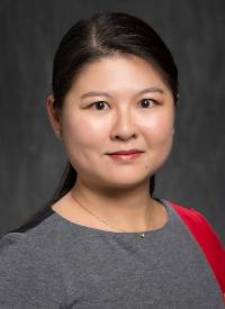Office of Data and Strategic Analytics AI and Data Analytics Faculty Fellows Program
The Office of Data and Strategic Analytics' AI and Data Analytics Faculty Fellows Program leverages faculty expertise to address a diverse range of decision-making challenges throughout the university. Collaborating with the Office of Data and Strategic Analytics team, Faculty Fellows employ cutting-edge data analytics and AI technologies and methodologies to optimize the accuracy, efficiency, and effectiveness of institutional decision-making processes. The AI/Data Analytics Faculty Fellows focus on the successful completion of a use case related to pressing issues in higher education. Fellows in this role are part of three distinct teams: Teaching and Learning, Student Success and Workforce Needs, or University Infrastructure and Facilities.
Key responsibilities include:
- Applying data analytics, AI, and machine learning techniques to analyze complex datasets, pinpoint patterns, and generate actionable insights for strategic decision-making.
- Collaborating with teams across the university to identify opportunities for applications.
- Promoting the sharing of knowledge and best practices associated with data analytics and AI.
- Aiding in fostering a culture of data-informed decision-making within the university.
AI/Data Analytics Faculty Fellows are given the opportunity to help promote and support the strategic direction of the university, shape policy decisions, and contribute to LSU’s mission of fostering excellence in education, research, and public service.
2024-2025 AI/Data Analytics Faculty Fellows
Teaching and Learning Team
Use Case: Problem Sets Generation Tool Targeted at LSU Gateway Courses with High DFW
Rates
To address the high DFW rates in specific LSU gateway courses (College Algebra - MATH 1021), Drs. Jennifer Qian and Supratik Mukhopadhyay are developing a Problem Sets Generation Tool. The AI tool will utilize advanced algorithms and machine learning to create personalized problem sets, adapting the difficulty level to each student's progress for each course. Accessible through a mobile app and integrated into LSU Moodle for learning analytics, the tool aims to reduce DFW rates significantly and contribute to the long-term success of students in STEM and humanities majors at LSU.

Jennifer Qian
Jennifer Qian
Professor of Professional Practice
Lutrill & Pearl Payne School of Education
Dr. Jennifer Qian leads and teaches in the Educational Technology program in the School of Education. Prior to joining LSU, she served as the doctoral research chair in the Doctor of Education program at Northeastern University, Boston. Dr. Qian has secured $2.4 million in research funding for innovative educational initiatives – recently serving as co-principal investigator to the NSF grant for the Future of Work at the Human-Technology Frontier Program with an award of approximately $1 million.
Dr. Qian’s research areas include technology-enabled academic innovation, digital transformation, technology leadership, and emerging technologies. She also serves as the Editor-in-Chief of the International Journal of Innovative Teaching and Learning in Higher Education.

Supratik Mukhopadhyay
Supratik Mukhopadhyay
Professor
Department of Environmental Sciences/Center for Computation & Technology
Dr. Supratik Mukhopadhyay has led the team that developed the DeepDrug AI Platform to the semifinals of the AI Intelligence XPrize in 2020. He has secured more than $8 million in research grants as principal/co-principal investigator, has published around 125 refereed papers in high-impact journals, and has been awarded four US patents with eight pending. He also launched the world’s first AI-discovered nutraceutical in 2021 and co-founded Ailectric, LLC, an artificial intelligence startup focusing on sound, text, and image analytics.
Dr. Mukhopadhyay’s research areas include data analytics and artificial intelligence for social good with applications to education, agriculture, drug discovery, wellness, biomedical imaging, coast and environment, transportation systems, video analytics, and robotics. He has developed AI and data analytics solutions that have utilized diverse and complex datasets ranging from geometry problems, natural language texts, satellite imagery, biomedical images, molecular fingerprints, graphs, full motion videos, and time series.
Student Success and Workforce Needs Team
Use Case: Integration and Deployment of Novel AI Tools for Rapid Assessment of Student
Success
Drs. Yu “April” Chen, Mostafa Elseifi, Mahmood Jasim, and Thanos Gentimis are developing a novel AI tool that will assist both incoming and current students in making critical academic decisions, such as selecting or changing majors, based on predictions of academic success, completion and graduation rates, time to completion, salary expectations, and post-graduation employability. Additionally, these AI models will provide valuable support for academic advisors, career counselors, and financial counselors, enabling them to offer evidence-based guidance to students. The team is focused on implementing these models within a mobile application.

Yu “April” Chen
Yu “April” Chen
Judith Walker Gibbs Endowed Associate Professor
Lutrill & Pearl Payne School of Education
Dr. Yu “April” Chen was awarded an NSF CAREER grant last year for a predictive analytics project on transfer students, totaling approximately $500,000. She has secured more than $8 million in research awards, her scholarly work has been featured in prominent higher education journals, and she serves on the editorial board for the Journal of The First-Year Experience and Students in Transition.
Her research combines advanced statistical and qualitative methods to investigate community college transfer students, STEM student success, and the experiences of international students.

Mostafa Elseifi
Mostafa Elseifi
Occidental Chemical Corporation Distinguished Professor
Department of Civil & Environmental Engineering
Dr. Mostafa Elseifi has over 25 years of academic and industrial experience in Civil Engineering. During his tenure at LSU, he has completed 30 research projects sponsored by NSF, US Dept of Transportation, LaDoTD, LA Board of Regents, and the National Cooperative Highway Research Program, for a total of $8.8 million. He has authored/coauthored 117 refereed publications in leading journals. Dr. Elseifi also serves on the East Baton Rouge Parish Engineer and Surveyor Selection Board.
His research interests include constitutive modeling and analysis of flexible pavement, laboratory characterization of hot-mix asphalt, tire-pavement interaction, and pavement instrumentation, and the digitization and implementation of machine learning applications, including virtual and data analytics emerging technologies.

Thanos Gentimis
Thanos Gentimis
Assistant Professor
Department of Experimental Statistics
Dr. Thanos Gentimis is an Assistant Professor in Experimental Statistics and also the leading member of the Digital and Precision Agriculture Initiative in the College of Agriculture, using machine learning algorithms to analyze large datasets in the agricultural field. He has also served as the Head of the Big Data and Health Informatics Lab at Florida Polytechnic and was a consultant for the USDA Risk Management Agency, using machine learning for risk prediction in farm management. He has published in 20 peer-reviewed journals, has been awarded two patents, and has secured $675,000 in research grants. He is currently serving as chair of a multi-state project for AI in Agroecosystems with more than 15 partner universities.
His field of expertise is in mathematics, computer science, statistics, data analytics, machine learning, and neural networks.

Mahmood Jasim
Mahmood Jasim
Assistant Professor
Division of Computer Science and Engineering
Dr. Mahmood Jasim's research interests include designing, developing, and evaluating decision-support systems for inclusive collection and analysis of large-scale public-generated data to enable effective and efficient data-driven decision-making to address complex socio-technical problems. His interdisciplinary research is spread across human-computer interactions (HCI), information visualization, and social computing. Dr. Jasim currently serves as the director of the Computer Human Interaction & Visualization Experience (CHIVE) Lab at LSU. He is the recipient of several best paper awards including CSCW 2020, DIS 2021 (Honorable Mention), and EuroVIS 2022 and has built decision-support systems that have been deployed and used across multiple cities in the US to facilitate hybrid town hall meetings.
University Infrastructure and Facilities Team
Use Case: Optimizing Indoor Environmental Conditions with Advanced Data Analytics
Drs. Yimin Zhu and Supratik Mukhopadhyay (see above) are applying data analytics to improve campus facility maintenance and planning. By integrating data from various sources and using machine learning techniques, such as recurrent neural networks, this project seeks to predict associations between indoor environmental conditions and maintenance schedules, building conditions, and weather. The project's outcomes will support better maintenance, retrofitting decisions, and provide information that will help to inform and improve decision making.

Yimin Zhu
Yimin Zhu
Pulte Homes Endowed Professorship in Construction Management
Bert S. Turner Department of Construction Management
Dr. Yimin Zhu is cross trained in construction management, management, and computer science. He has authored/co-authored 84 peer-reviewed journal articles and 86 peer-reviewed conference articles and has secured over $6 million in research awards during his tenure at LSU.
Dr. Zhu’s research interests are sustainability in the built environment and informatics including systems integration of construction software applications; stochastic time; cost and environmental impact optimization of construction processes; and concept learning in construction education.


